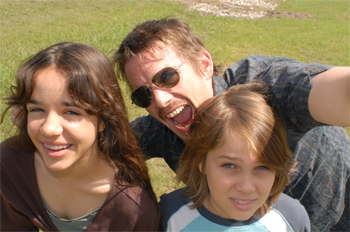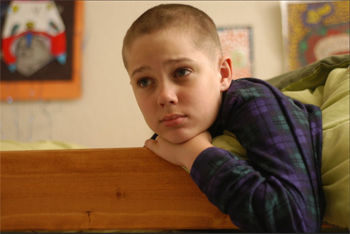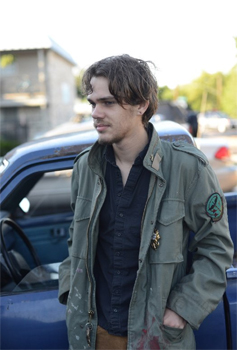Numbering Our Days
Psalm 90
By Dan Clendenin
For Sunday October 26, 2014
Lectionary Readings (Revised Common Lectionary, Year A)
Deuteronomy 34:1–12 or Leviticus 19:1–2, 15–18
Psalm 90:1–6, 13–17 or Psalm 1
1 Thessalonians 2:1–8
Matthew 22:34–46
It's the season for birthdays at my house — five of them in ten weeks, including my mother-in-law's 90th birthday. She's still going strong, and why not? Her mother lived to be a hundred.
When you're a kid, birthdays are the stuff of parties with pointed hats. The years roll on, and birthdays provoke jokes about getting older. At some point, birthdays become poignant reminders of the passage of time.
In Deuteronomy 34, Moses lives to see the promised land, and then dies at the ripe old age of 120. He's then buried in an unmarked grave. Psalm 90 ponders how "a thousand years in your sight / are like a day that has just gone by." No matter how long we live, our years vanish like a puff of smoke, they wither away like dry grass.
 |
From the movie Boyhood. |
If you're looking for a great movie, consider Boyhood by the director Richard Linklater. Dan Chiasson calls it "a great film, the greatest American movie I have ever seen in a theater." Boyhood is about the passage of time. It's a time-lapse experience that "makes real what we cannot see" at any single point in time.
Linklater filmed Boyhood across twelve years, using the same actors, to follow the life of Mason Jr. (played by Ellar Coltrane). Coltrane was six years old when they started filming for a few days every year, and eighteen when they finished in 2013. Linklater's daughter plays Mason's older sister Samantha. Everyone in this movie ages before our eyes.
In Boyhood we watch twelve years of an ordinary life fly by in three hours. There's no plot in the normal sense of the word. Instead, the movie has what Manohla Dargis calls a "distinctly quotidian register." Life is what happens when no one's watching. "We happen upon ourselves when nothing much happens to us," says Anthony Lane, "and we are transformed in the process."
With no plot or action, the film is simply the succession of ordinary moments that make a life — family vacations, fights about homework, embarrassing haircuts, birthday parties, a first girlfriend, biking with your buddies, and good parents who make some bad choices while doing the best they can. As any parent of older children can attest, Mason's twelve years pass in a flash.
Chiasson suggests that the movie is really about time itself and how we measure it. My wife, for example, made old school scrapbooks that she gave to our children at high school graduation. To say that looking at them is emotionally evocative would be a gross understatement.
 |
From the movie Boyhood, |
When Mason's family vacates their house to move to Houston, his mother tells him to paint over the door jamb with the pencil marks that plotted the growth of Mason and Samantha. Today we have Snapchat and Instagram.
Within these uneventful days and ordinary lives, there's a palpable search for the sacred. Mason asks his dad if there is any "real magic" in the world, like elves that really exist. He's given a toy owl, a symbol of wisdom. His dad gives a talk at school about gods and goddesses.
Mason also visits his stepmother's family. They are conservative Christians, and Chiasson observes how Linklater portrays them as "compassionate, kind, funny, and even a little bawdy." For his birthday they give Mason a Bible with his name on it, along with a rifle. The scene includes a sermon by a likeable Texas preacher about doubting Thomas: "Blessed are those who have not seen and yet believe."
Linklater thus "captures moments in time and relinquishes them as he moves from year to year," says Dargis. "He isn’t fighting time but embracing it in all its glorious and agonizingly fleeting beauty."
This sounds like Psalm 90: "Teach us to number our days aright, / that we may gain a heart of wisdom." The gospel version of this prayer is to "keep asking, keep seeking, keep knocking." In Rilke's famous words, "live the questions."
The march of time in Boyhood is not only poignant, it's painful, as it is with all of our lives. It's full of "honest, raw hurt" (Dargis).
There's a terrifying dinner scene of a drunken step father, the ominous dangers of drugs, and the childhood pain from an absentee father who breaks his promises. And so we wonder whether Mason will not "just survive the squalls of youth but somehow grow from boy to man without suffering a death of the spirit." (Lane).
 |
From the movie Boyhood. |
"Life is difficult," wrote M. Scott Peck in one of the most famous first sentences ever (The Road Less Traveled). "This is a great truth," said Peck, "one of the greatest truths. It is a great truth because once we truly see this truth, we transcend it."
Psalm 90 conveys a sense of Weltschmerz, a feeling of melancholy, apathy, and world-weariness. The poem acknowledges the inherent futility to life, such that "we finish our years with a moan." Whether we live eighty, ninety, or even a hundred years, "yet their span is but trouble and sorrow, / for they quickly pass, and we fly away."
We're all "fighting the long defeat," said Tolkien. And nobody gets a free pass.
Despite the passage of time and the pain of life, the psalmist doesn't cave in to stoicism or despair. He prays to be a person of joy and gladness. "Satisfy us in the morning with your unfailing love, / that we may sing for joy and be glad all our days. / Make us glad for as many days as you have afflicted us, / for as many years as we have seen trouble."
There's a delicate balance here between living in reality rather than denying it, and nonetheless trusting our little lives to God's greater providence. In his poem The Mad Farmer Liberation Front, the poet-farmer Wendell Berry thus advises:
"Expect the end of the world. Laugh.
Laughter is immeasurable. Be joyful
though you have considered all the facts."
Ultimately, "the greatest honor we can give Almighty God," said the English mystic Juliana of Norwich (1342–1416),"is to live gladly because of the knowledge of his love."
Notes:
Dan Chiasson, "Making Real What We Cannot See," NYRB (September 25, 2014).
Manohla Dargis, "From Baby Fat to Stubble," The New York Times (July 10, 2014).
Anthony Lane, review of Boyhood in The New Yorker (July 21, 2014).
Image credits: (1) Imdb.com; (2) Imdb.com; and (3) Imdb.com





